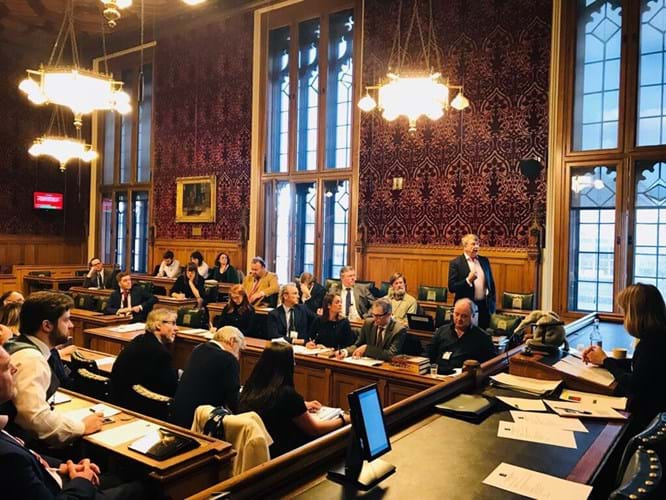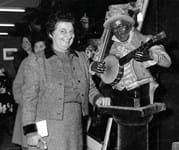
The proposals, previously discussed informally, formed part of a meeting hosted by the All-Party Parliamentary Group (APPG) on Endangered Species in the House of Commons last week.
Economic filter
Speaking to a handful of parliamentarians, James Lewis, auctioneer at Bamfords in Derby, said the charging of a license fee when selling antique ivory would create an economic filter that would remove problematic objects – or those of a low value - from the market.
“A blanket ban will not work. A licence system where fine pieces could still be sold would wipe out 90% of the junk that we find ourselves selling at auction and at fairs. A licence fee would preserve the best, it would get rid of the rubbish and it would help save the elephants.”
Other presentations were made by Mark Dodgson, secretary general of BADA, Rebecca Davies, chief executive of LAPADA plus dealers Philip Mould and Paul Moss (Sydney Moss) alongside those from four animal welfare groups and two associations representing musicians and instrument makers.
Moss acknowledged the need to “stamp out the trade” in modern trinkets but challenged the government to harness the expertise that exists in London and beyond to determine the age of ivory works of art.
Davies said: “While we do not believe that carvings made from recently poached ivory are circulating to a remotely significant degree in the UK but we would welcome a system of third party verification of carvings to confirm this on a case by case basis.”
“The chair of the ivory group was shown a portrait miniature and a netsuke
During the debate – attended by ATG – members of the trade showed objects that would suffer if a total ivory ban came into force. Chair of the group Rachel Maclean MP was shown a portrait miniature, a netsuke, images of a chryselephantine sculpture and other works of art.
The government is proposing exemptions to a total ivory ban for: musical instruments; items containing only a small proportion of ivory (the de minimis exemption); items of ‘significant artistic, cultural and historic value’ and sales to and between museums.
Need for exemptions
In the Commons the animal welfare lobby groups acknowledged the need for exemptions and were largely welcoming of those proposed by Defra with the exception of the ‘significant artistic, cultural and historic value’ clause.
There also appeared to be consensus that portrait miniatures should be exempt.
Attendees argued it was a chance for interested parties to hear all sides of the argument.
Speaking after the event, Mould told ATG: “We have heard so much emotive and persuasive argument from the elephant lobby. But today we witnessed a response of comparable passion from the art and antiques trade which I am confident will be integrated into the legislative thinking.”
David Cowdrey, head of policy and campaigns at IFAW, added: “It was a great opportunity for both the wildlife lobby and the antiques trade to hear each other’s viewpoint.”
Davies said the meeting "formed just one part of the work we are doing with parliamentarians on the exemptions to the proposed ivory ban".
She added: "It was a positive meeting and we will continue to provide information to Defra during and after the consultation process.”
Presentations made on the day will be circulated to MPs and submitted directly into the government consultation that runs until December 29.














